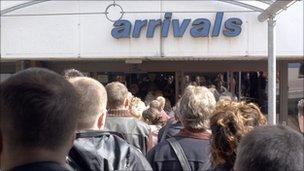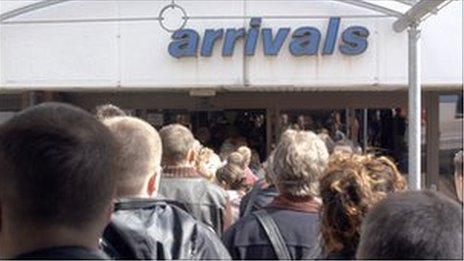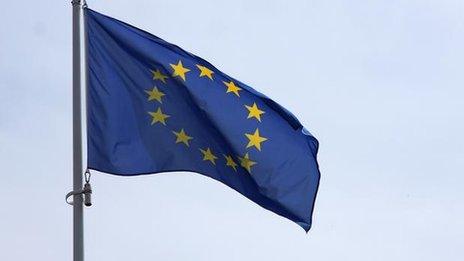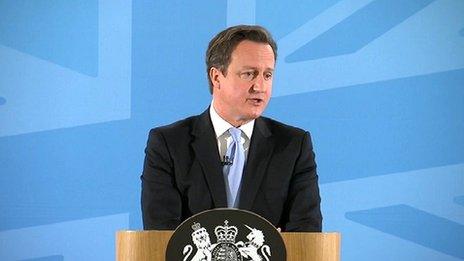Analysis: BBC Bulgaria-Romania EU immigration polls
- Published

European Union restrictions on Romanians and Bulgarians working expire at the end of 2013
Surveys commissioned by BBC Newsnight in Bulgaria and Romania suggest that the removal of work restrictions at the end of the year has not yet had an impact on numbers of people planning to move to the UK or wider EU. BBC Newsnight's Sanchia Berg gives her analysis of the results.
Many Bulgarians say they would like to work abroad. The country has the lowest income per capita in the European Union (source Eurostat GDP per capita) and many people struggle financially.
According to Professor Alexander Stoyanov of the Vitosha polling agency in the Bulgarian capital Sofia some surveys have suggested 30-50% would like to move. However, he said, over the last decade official statistics showed that only 6-7% of Bulgarians had actually gone.
There is a significant gap between aspiration and making real concrete plans.
We asked Prof Stoyanov and Gallup Romania to draw up questions which would give a better sense of how many people are really looking to move to the UK from these two countries.
We interviewed over 1,000 people in each country, face to face.
We found that in Romania very small numbers of people, 1% of the total survey sample, said they were looking for work in the UK in 2013 or 2014, whether with a recruitment agency or on their own.
In Bulgaria the figures were higher: 4.2% of those surveyed. However most people interested in coming to the UK, from both countries, said they would only move with a firm offer of work, either from an agency or directly from a company.
For now, more people are planning to move this year, rather than next, but as 2014 approaches, intentions may change.
That is one reason why it is hard to predict precise numbers from the research - the other is that the sample sizes, especially for concrete preparations, are very small.
The survey was complex. It had a long series of questions, ending up with concrete preparations, to try to filter out aspiration, and only capture those who are making real plans.
First, respondents were asked to pick a country in the EU - and asked the questions, then they were asked about the UK directly and the questions were repeated.
We were advised by the polling agencies that not all respondents would think of the UK as an EU member. We have used the "total intentions" result for our report.
The survey provides a wealth of information about the kind of people who are currently interested in moving to the UK.
As with the movement of Poles and nationals from the other A8 countries (Czech Republic, Estonia, Hungary, Latvia, Lithuania, Slovakia and Slovenia) in 2004, the Bulgarians and Romanians intending to work in Britain are more likely to be male and single.
The survey suggests that the Romanians who are interested in working in Britain are more likely to have a university degree than the average respondent, they are more likely to be employed, and they are likely to have more money than the average in the survey.
The largest group is those aged 25-44.
The Bulgarians, by contrast, are more likely to be unemployed and as likely to have a degree as the average respondent. More of them are likely to struggle financially. More of them are young, aged 18-24, than the average in the survey.
However, when we asked if a change in state benefits for migrants might affect any decision to move to the UK, most Romanians intending to move to the country said it would - to some extent, while a majority of Bulgarians intending to head to the UK said it would not.
Peter Flade, of Gallup UK, described this finding as "puzzling". So far those who have moved to the UK from new European states are less likely to claim benefits than others in Britain.
We asked some young Romanian professionals what they made of this result. Daniel Farmache, a 24-year-old banker said he understood it. "It has to make a difference," he said. He thought people would like a safety net in case something went wrong.
One of his friends, Corina Pisc, said that it was disparaging for Romanians to be called "migrants".
"As far as I know we are EU workers," she said. "We should have the same rights."
The full results of the BBC Newsnight polls will be published online later on Monday 22 April 2013. You can watch Sanchia Berg's full report on the polls' findings on Monday's Newsnight at 10.30pm on BBC Two, then afterwards on the BBC iPlayer or Newsnight website.
- Published22 April 2013

- Published14 May 2014

- Published21 April 2013

- Published25 March 2013
